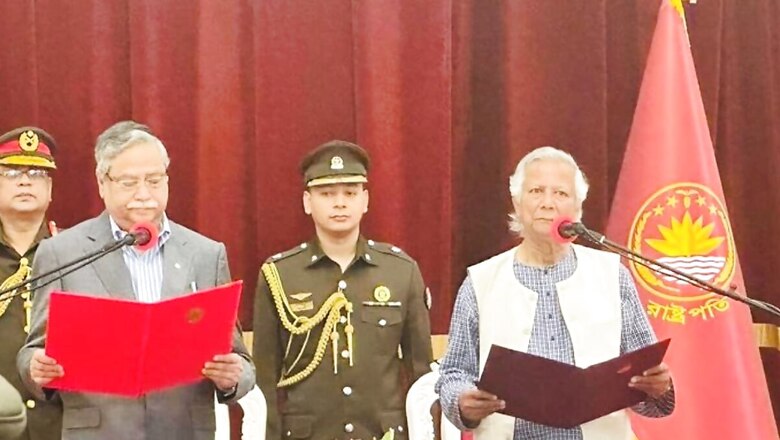
views
Since its independence in 1971, Bangladesh has possibly had the most troubled political history in India’s neighbourhood, marked by repeated military coups, a series of short-lived caretaker governments, riots and incessant violence, civilian governments accused of rigged elections, the boycott of elections of the Opposition parties, incarceration and brutal assassination of political leaders, and massive corruption, especially in the highest echelons of whichever government was in power.
The most recent development was mass student-led protests in July and August 2024, which led to widespread violence, culminating in the ouster of Prime Minister Sheikh Hasina, who managed to flee to India just before the mob took over her official residence. Army Chief Waker-Uz-Zaman assumed power on August 5, 2024. He announced a caretaker government, with 84-year-old Nobel laureate Muhammad Yunus being named the chief advisor to the interim government.
Since these tumultuous events, there have been scores of comments and analyses on the genesis of the current crisis, and what will happen in the future. My own view is that there is a real danger of indefinite civil war in the country, and any respite from anarchy and violence, will be, as in the past, short-lived, leading once again to the ceaseless confrontation between civilian, military, and—now increasingly—religious extremist groups.
The reasons for this possibility need to be considered. First, the two main political parties, the Awami League and the Bangladesh Nationalist Party (BMP), led by Sheikh Hasina and Khaleda Zia, respectively, have a history of confrontation that is immersed in total mistrust, bitterness, acrimony, and violence. This irreconcilable relationship has carried on for generations, nurtured by the volatile student-wing supporters of both leaders. This deep rift in the civilian spectrum of Bangladesh politics is unlikely to end soon, even though Hasina may have left.
Second, the armed forces have always been an intrinsic part of the country’s power matrix, with generals after generals taking over when civilian governments collapsed, or violent displays of discontent reaching unacceptable proportions. On seizing power, the army leaders were not always short-term arbiters midwifing a new civilian government. Mostly, once they got power, be it in the form of General Zia Rehman or General Ershad, they kept it for as long as they could, and it has yet to be seen if General Zaman, who has taken over now, will do otherwise.
Third, civilian politics itself is inextricably tied up with the army. Khaleda is the widow of General Zia-ur-Rehman, who through a military coup became President of the country and its chief martial law administrator. He was assassinated in 1981 by dissident elements in the military. As is well-known, Sheikh Hasina’s father, Mujibur Rehman, who led the movement to create Bangladesh, was massacred by army officers in a military coup, along with his entire family, with Hasina and her sister providentially escaping because they happened to be abroad. In other words, the leaders of the two main parties have been personally victims—or beneficiaries, depending on how you view it—of the intervention of the military.
Fourth, student power in Bangladeshi politics has assumed a power of its own. This has its origins in Bangladesh’s war of independence, where the Mukti Bahini had large segments of the youth, who continued to remain active players in politics thereafter. It was these students who spearheaded the quota reform movement this year. They were also at the forefront of the anger against Hasina for the increasingly autocratic and undemocratic nature of her 16-year rule. It is unlikely that these students will now quietly go back to their universities, especially since they are themselves divided into several factions, and riven with internecine rivalries.
Fifth, there is among these students increased Islamic radicalisation. The Bangladesh Jamaat-e-Islami, legalised in 1975 under a military regime, was declared illegal in 2018 by the country’s Supreme Court. However, the ban only drove it underground, and enabled it to clandestinely expand its network in universities and elsewhere. Evidence suggests that it had a significant role in the student protests leading to Hasina’s overthrow, especially since she had declared Bangladesh to be a secular country. The Jamaat is now likely to play a much more important role, since it was an ally of the BMP party when Khaleda was PM, and she has been released from jail following the end of Hasina’s regime. Matters are only likely to worsen with open violence against the already diminished Hindu minority, and Awami League supporters.
Finally, there are foreign powers, such as Pakistan, who may have a vested interest in either supporting a military regime, or perpetuating anarchy, or encouraging radical Islamist forces. Pakistan has never forgotten the division of the country through the creation of Bangladesh, nor has it forgiven India for its key role in enabling this to happen. Sheikh Hasina’s obvious closeness to India was resented by it, as well as China. An unstable and economically precarious Bangladesh is a happy hunting ground for such countries.
It is doubtful if a physically unwell and aged Muhammad Yunus will be able to manage or contain this kind of chaos. Bangladesh is possibly in for a long period of internal upheaval. This has extremely important consequences for India, but what that means, and what India’s policy should be, requires a separate column.
The author is a former diplomat, an author and a politician. Views expressed in the above piece are personal and solely those of the author. They do not necessarily reflect News18’s views.




















Comments
0 comment